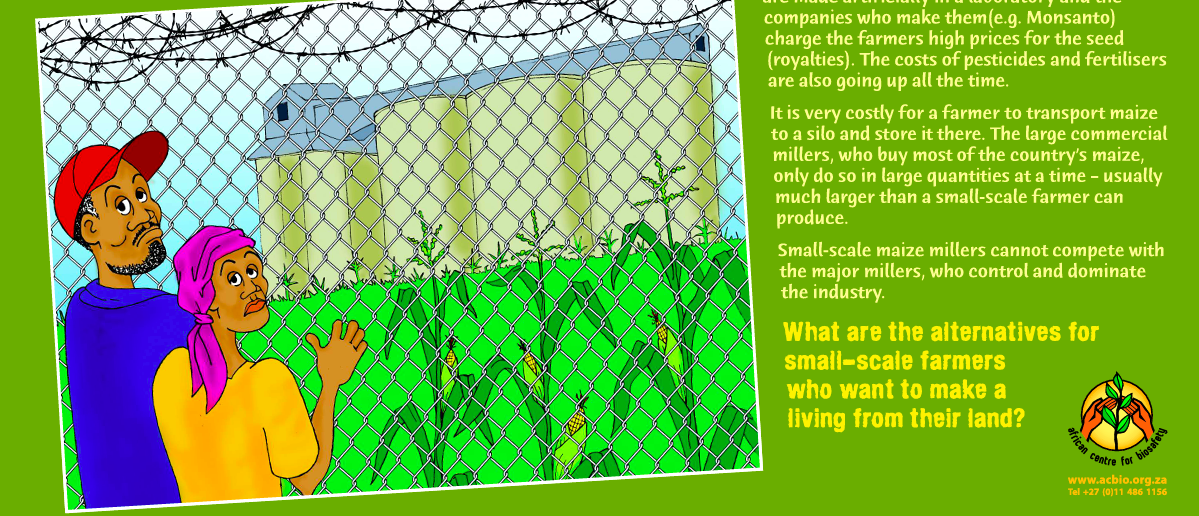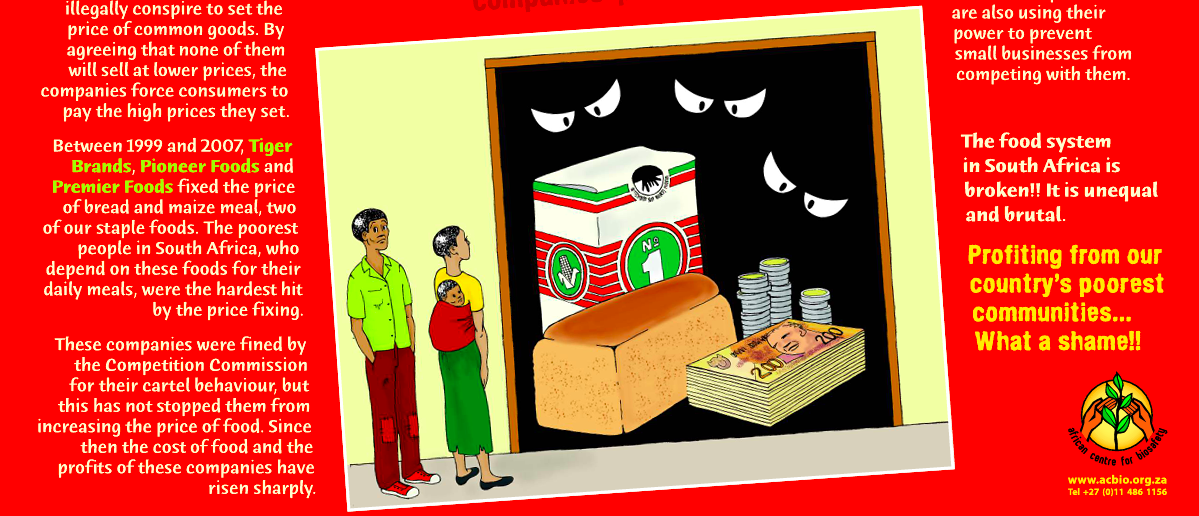Latest Resources

3 December 2014
Who owns our food systems: Small-scale farmers and the maize value chain
Small-scale maize millers cannot compete with the major millers who control and dominate the industry. What are the alternatives for small-scale farmers who want to make a living from their land? Download this factsheet: English | Afrikaans | Sotho | Zulu To read the rest of the fact sheets in this series, click here.

3 December 2014
Who owns our food systems: Fixing the price of food
Between 1999 and 2007, Tiger Brands, Pioneer Foods and Premier Foods fixed the price of bread and maize meal, two of our staple foods. The poorest people in South Africa, who depend on these foods for their daily meals, were the hardest hit by the price fixing. Download this factsheet: English | Afrikaans | Sotho […]

3 December 2014
Who owns our food systems: GM pap — No choice for South Africans
Labelling does not give South Africans true choice; the only maize available on the market is GM. This is food fascism! Download this factsheet: English | Afrikaans | Sotho | Zulu To read the rest of the fact sheets in this series, click here.

20 March 2014
AFSA’s comments on ARIPO’s response to civil society: Draft legal framework for plant...
At the 2013 November meeting of the Administrative Council and Council of Ministers of ARIPO countries held in Kampala, Uganda, several documents on the proposed legal framework for Plant Variety Protection were distributed. Also circulated was a Matrix1 containing ARIPO’s responses to a detailed submission by civil society organisations (CSOs) dated 6th November 2013. In […]

21 October 2013
ARIPO’S Plant Variety Protection law based on UPOV 1991 criminalises farmers’ rights ...
The Alliance for Food Sovereignty in Africa [1] is gravely concerned about a draft law developed under the auspices of the Africa Regional Intellectual Property Organisation (ARIPO), dealing with a harmonised regional legal framework for the protection of plant breeders’ rights, titled “Draft Regional Policy and Legal Framework for Plant Variety Protection”. The ARIPO legal […]

1 October 2013
AFSA Statement Condemning COMESA Approval of GMO Policy
The Alliance for Food Sovereignty in Africa[1] is alarmed at the approval during September 2013, by the Council of Ministers of the Common Market for East and Southern Africa (COMESA) of the COMESA ‘Draft Policy Statements and Guidelines for commercial planting of GMOs, Trade in GMOs and Emergency Food aid with GMO content.’ The COMESA […]

1 October 2013
AFSA Statement Condemning COMESA Approval of Seed Regulations
The Alliance for Food Sovereignty in Africa strongly condemns the approval during September 2013, by the Council of Ministers of the Common Market for East and Southern Africa (COMESA) of the draft COMESA Seed Trade Harmonization Regulations, 2013 (hereinafter referred to as the ‘Seed Regulations’). The COMESA Seed Regulations will greatly facilitate agricultural transformation in […]

9 September 2013
Civil Society Calls for PUBLIC Parliamentary Hearings on Genetically Modified Food
On the 6th of August 2012, the African Centre for Biosafety (ACB), supported by 18 health professionals, more than 7000 individuals, 22 organisations and the Honourable Cheryllyn Dudley of the African Christian Democratic Party (ACDP), submitted a petition to the National Assembly. The petition called for a review of the government decision to allow the […]

20 July 2013
Open letter to the National Chamber of Milling on GMO labelling and the development of a GM-Free ...
In July 2012 the National Chamber of Milling (NCM) posted a position on Genetically Modified Organisms (GMOs) on its website, in which it supports the principle of consumer choice and pledges to “encourage identity preservation within the grain supply chain to enable clear labelling of our product to the consumer market”. However, the biotech industry […]

5 July 2013
Africa demands Tiger Brands to Go GM Free
A letter from the ACB to Tiger Brands is supported by 39 African organisations working at grass-roots on issues of agriculture, consumer concerns and primary health care calling upon Tiger Brands to go GM free. Tiger Brands operates in 25 African countries and has ownership of a number of food manufacturers on the continent including […]
